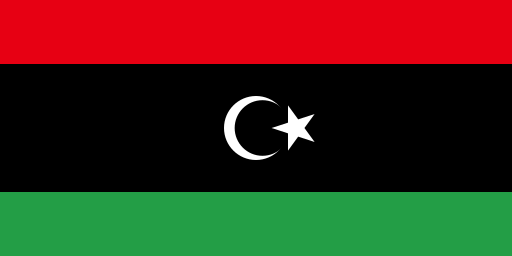Various The source code of this SVG is valid. This vector image was created with a text editor., Public domain, via Wikimedia Commons
Last month in Berlin, international diplomats, including US Secretary of State Antony Blinken, met with Libya’s transitional Government of National Unity to promote much-needed political progress in the country following years of civil war.
Ahead of the meeting, Blinken outlined the goals, which included an “opportunity to reinforce the support of the international community for Libya as it moves forward toward elections, sustaining the ceasefire, [and] getting foreign forces out of the country…”
Progress was reportedly made in the talks, including on how to roll back external interference in Libyan affairs. However, the US can and must do more to promote lasting stability in Libya and the increasingly important Eastern Mediterranean more broadly.
And thankfully, the groundwork for such efforts has been laid. Earlier in June, the Biden administration appointed Ambassador Richard Norland as special envoy to Libya. The decision is both welcome and overdue.
The purpose of appointing a special envoy must extend beyond simply addressing regional volatility in the short term. The assignment’s aims should be to contribute meaningfully to long-term stability in the broader Eastern Mediterranean, following the tenuous October 2020 ceasefire between the country’s two major warring factions.
Mitigating Turkish Influence
Lasting order in Libya will depend largely on America’s ability to mitigate Turkish influence in the region, which brings with it the shadow of the Muslim Brotherhood, threatening both US interests and the interests of those in the Eastern Mediterranean.
Turkey has been a key factor in instigating and perpetuating Libya’s violent civil war by supporting the Islamist-dominated Government of National Accord. Ankara is currently positioning itself to remain a steady presence in Libyan politics, even after the establishment of a permanent government.
In response, Washington should do everything in its power to support the conclusion of an agreement that recognizes the sovereign will of the Libyan people. As Libya gears up for democratic elections, slated to take place this December, intra-Libyan negotiations are unfolding regarding domestic security and financial and political arrangements.
The United States should support the establishment of a non-Islamist system that genuinely supports the interests of the Libyan people. Doing so will hinge at least partially on the ability of the United States to shield Libya from Turkish machinations.
Energy Politics
Secondly, the envoy should consider ways to further solidify the Eastern Mediterranean Gas Forum (EMGF) to ensure a regional counterweight to Turkey’s attempts to disrupt the regional energy markets.
The EMGF — consisting of Cyprus, Egypt, Greece, Israel, Italy, Jordan, and the Palestinian Authority —offers an additional avenue for isolating Ankara in response to its regional aggression. The EMGF also promises enhanced cooperation between several Arab partners and Europe, bringing together for the first time into one international organization energy producers, consumers, and transit partners.
Notably, Ankara has not taken kindly to the formation of — and its exclusion from — the EMGF and has fomented various disruptions to the energy markets in the Eastern Mediterranean, including the conclusion of controversial maritime arrangements.
Indeed, the current maritime agreement between Turkey and Libya establishes an exclusive economic zone between Turkey’s southern Mediterranean coast to Libya’s northeast shore to the dismay of Turkey’s neighbors.
With the support of EU leaders, Greece and Cyprus have argued that the agreement violates international law, specifically the 1982 Montego Bay Convention, by disregarding the maritime rights of other eastern Mediterranean countries. Under the auspices of the new envoy, the US should support the peaceful resolution of this maritime boundary dispute and ensure the agreement is in line with international law.
Russia’s Role
In addition to fending off Turkish influences, the United States should also be wary of Russia, which threw its support behind the Libyan National Army during the civil war and remains invested in ensuring European reliance on Russian natural gas.
Peaceful collaboration within the Eastern Mediterranean — especially in the energy sector — threatens Moscow’s domination of global markets, meaning the Kremlin has a vested interest in sowing and maintaining chaos.
Moscow also sees Libya’s location as an attractive outpost for intimidating NATO, especially given the recent Ukrainian crisis. Tripoli also offers Moscow the opportunity to potentially establish a warm-water port in the Mediterranean. Furthermore, in time, Russia’s presence in Libya could pose problems for access to the Suez Canal, a critical node in the global shipping network.
Without the United States’ mitigating influence as a broker of stability, Libya gives Russia a powerful foothold in North Africa.
Shielding Libya
Ambassador Norland’s new role is a tall order, but not an unclear one. While Washington should remain focused on facilitating the establishment of a government representative of the Libyan people, its long-term ambitions should be geared towards reducing the influence of Ankara and Moscow, both of which represent power centers that thrive on chaos and disorder in Libya.
The Berlin Conference was a start at resolving political instability in Libya; however, the long-term success of such efforts will depend on the ability of Libya to shield itself from bad-faith actors.
Retired US Air Force Gen. Kevin P. Chilton served as the head of US Strategic Command. He is a member of The Jewish Institute for National Security of America’s (JINSA) board of advisers and was a participant in JINSA’s 2017 Generals and Admirals Program.

